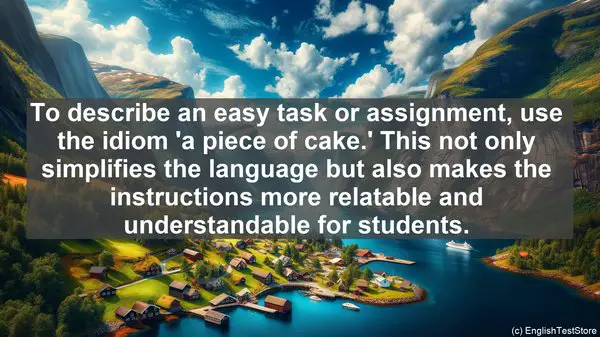1. Break the Ice
As a graduate teaching assistant, the first day of class can be nerve-wracking. But, with the idiom ‘break the ice,’ you can initiate conversations, make students feel comfortable, and set the tone for the entire semester.
2. The Ball is in Your Court
When assigning tasks or projects, use the idiom ‘the ball is in your court’ to convey that it’s the students’ responsibility to take action. This idiom emphasizes the importance of student initiative and ownership.

3. A Piece of Cake
To describe an easy task or assignment, use the idiom ‘a piece of cake.’ This not only simplifies the language but also makes the instructions more relatable and understandable for students.
4. Hit the Nail on the Head
When a student provides an accurate answer or solution, use the idiom ‘hit the nail on the head’ to acknowledge their correctness. This encourages active participation and boosts student confidence.
5. The Early Bird Catches the Worm
To emphasize the importance of punctuality and time management, refer to the idiom ‘the early bird catches the worm.’ This not only conveys a valuable life lesson but also sets expectations for class attendance.
6. Put All Your Eggs in One Basket
When discussing the need for diversification or considering multiple options, use the idiom ‘put all your eggs in one basket.’ This idiom highlights the risks of relying solely on one strategy or approach.
7. A Picture is Worth a Thousand Words
To emphasize the power of visual aids or encourage students to use visuals in their presentations, refer to the idiom ‘a picture is worth a thousand words.’ This idiom underscores the impact of visual communication.
8. Rome Wasn’t Built in a Day
When discussing long-term projects or goals, use the idiom ‘Rome wasn’t built in a day.’ This reminds students that significant achievements require time, effort, and perseverance.
9. Two Heads are Better Than One
To encourage collaboration and teamwork, use the idiom ‘two heads are better than one.’ This highlights the benefits of collective thinking and problem-solving.
10. Practice Makes Perfect
As a closing idiom, ‘practice makes perfect’ reinforces the importance of consistent effort and repetition. This encourages students to engage in regular practice to enhance their skills and knowledge.

